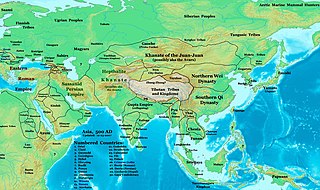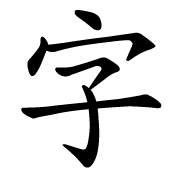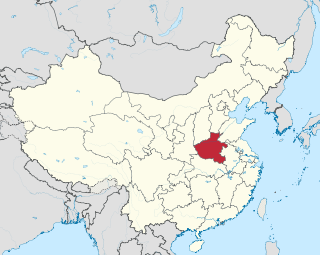Background
Gao Jifu was born in 596. He was from the locale that would eventually be the Tang Empire's De Prefecture (德州, roughly modern Dezhou, Shandong). His grandfather, Gao Biao (高表), was a commandery governor during either the late Northern Wei dynasty or Northern Wei's branch successor state, Eastern Wei. His father, Gao Heng (高衡), was a county magistrate during the Sui dynasty. Gao Jifu himself was said to be both studious and trained in martial arts when he was young, and was also said to be particularly appropriate in his actions during the mourning period after his mother's death. His elder brother, Gao Yuandao (高元道), served as the magistrate of Ji County (汲縣, in modern Xinxiang, Henan). In 618 or 619, when the Sui Empire was on the verge of total collapse after the death of Emperor Yang, the people of Ji County surrendered to agrarian rebels, and Gao Yuandao was killed in the process. Gao Jifu led his brother's followers in combat and was able to capture and execute those [2] who killed his brother, taking their heads to his brother's tomb to be offered to his brother. Thereafter, he gathered his own band of agrarian rebels. He soon submitted to the rule of the Tang dynasty, one of the regimes that rose out of the confusion of the Sui Empire's collapse, along with another rebel leader in the region, Li Yude (李育德), [3] who had been a general of the rebel ruler Li Mi, and was made the military advisor to Li Yude, who was made the prefect of Zhi Prefecture (陟州, roughly modern Jiaozuo, Henan).

Dezhou is a prefecture-level city in northwestern Shandong province, People's Republic of China. It borders the provincial capital of Jinan to the southeast, Liaocheng to the southwest, Binzhou to the northeast, and the province of Hebei to the north.

Shandong is a coastal province of the People's Republic of China, and is part of the East China region.

The Northern Wei or the Northern Wei Empire, also known as the Tuoba Wei (拓跋魏), Later Wei (後魏), or Yuan Wei (元魏), was a dynasty founded by the Tuoba clan of the Xianbei, which ruled northern China from 386 to 534 AD, during the period of the Southern and Northern Dynasties. Described as "part of an era of political turbulence and intense social and cultural change", the Northern Wei Dynasty is particularly noted for unifying northern China in 439: this was also a period of introduced foreign ideas, such as Buddhism, which became firmly established.
During Emperor Taizong's reign
Gao Jifu's activities for the next several years are not recorded in history. It was said that early in the reign of the second Tang emperor, Emperor Taizong, Gao was serving as assistant imperial censor, and he often pointed out faults of the other officials, as his duty as assistant censors, without fearing reprisals. He was eventually made a midlevel official at the legislative bureau of the government (中書省, Zhongshu Sheng). In 634, he was serving as such when, in response to Emperor Taizong's call for officials to offer suggestions, Gao offered five suggestions, in these areas:
- He suggested that greater emphasis should be paid to promoting officials who were kind and honest.
- He suggested that the conscription of people into public works projects should be reduced.
- He suggested that ways should be found to curb the tendency for princesses and nobles to conduct business to make more money, as he opined that their stipends were already sufficient.
- He suggested that local officials' salaries should be increased, as he opined that at the time the salaries were not sufficient for them to support their families.
- He suggested that clear guidelines should be established that the emperor's sons be considered lower in rank than the emperor's brothers, as it was not clear at the time, leading to confusion in how the emperor's sons and brothers dealt with each other.
Emperor Taizong praised him for his suggestions.
In 643, Gao was made an assistant head of household to the crown prince, Li Zhi. In response to further suggestions about governance that Gao suggested, Emperor Taizong awarded him with a stalactite, then used as medication, stating, "You provided medication for the state, so I am providing you with medication." In 644, he was made the assistant minister of civil service affairs, and was said to be appropriate in his selection of officials. Emperor Taizong awarded him with a gold-plated mirror to symbolize that his acts were clean and honorable.

A crown prince is the male heir apparent to the throne in a royal or imperial monarchy. Its female form is crown princess, which may refer either to an heir apparent or, especially in earlier times, the wife of the person styled crown prince.

Emperor Gaozong of Tang, personal name Li Zhi, was the third emperor of the Tang dynasty in China, ruling from 649 to 683. Emperor Gaozong was the son of Emperor Taizong and Empress Zhangsun.

A stalactite is a type of formation that hangs from the ceiling of caves, hot springs, or manmade structures such as bridges and mines. Any material that is soluble, can be deposited as a colloid, or is in suspension, or is capable of being melted, may form a stalactite. Stalactites may be composed of lava, minerals, mud, peat, pitch, sand, sinter, and amberat. A stalactite is not necessarily a speleothem, though speleothems are the most common form of stalactite because of the abundance of limestone caves.
In 645, during Emperor Taizong's campaign against Goguryeo, Emperor Taizong left Li Zhi at Ding Prefecture (定州, roughly modern Baoding, Hebei), to be in charge of logistics, assisted by a number of officials led by the chancellor Gao Shilian, and Gao Jifu was a member of Li Zhi's staff there. [4] In 648, he was made Zhongshu Ling (中書令)—the head of the legislative bureau and a post considered one for a chancellor, and also served as minister of civil service affairs. He also participated in the editing of imperial history, and was enfeoffed as the Duke of Tiao—his home county.

Goguryeo, also called Goryeo, was a Korean kingdom located in the northern and central parts of the Korean Peninsula and the southern and central parts of Manchuria. Along with Baekje and Silla, Goguryeo was one of the Three Kingdoms of Korea. It was an active participant in the power struggle for control of the Korean peninsula and was also associated with the foreign affairs of neighboring polities in China and Japan.

Baoding is a prefecture-level city in central Hebei province, approximately 150 kilometres (93 mi) southwest of Beijing. At the 2010 census, Baoding City had 11,194,372 inhabitants out of which 2,176,857 lived in the built-up area made of 3 urban districts and Qingyuan and Mancheng counties largely being conurbated, on 1,840 km2 (710 sq mi). Baoding is among 13 Chinese cities with a population of over 10 million, ranking seventh.

Hebei is a province of China in the North China region. The modern province was established in 1911 as Zhili Province or Chihli Province. Its one-character abbreviation is "冀" (Jì), named after Ji Province, a Han dynasty province (zhou) that included what is now southern Hebei. The name Hebei literally means "north of the river", referring to its location entirely to the north of the Yellow River.

Zhangsun Wuji, courtesy name Fuji, formally the Duke of Zhao, was a Chinese official who served as a chancellor in the early Tang dynasty. He was Empress Zhangsun's brother, which made him a brother-in-law of Emperor Taizong and a maternal uncle of Emperor Gaozong. He was an important advisor to Li Shimin when the latter was still the Prince of Qin during the reign of his father, Emperor Gaozu. He helped Li Shimin overcome his brothers Li Jiancheng and Li Yuanji in a succession struggle at the Xuanwu Gate Incident, eventually enabling Li Shimin to become the heir apparent and later the emperor. He was also instrumental in Emperor Taizong's selection of Li Zhi as the Crown Prince, and was exceedingly powerful after Li Zhi took the throne as Emperor Gaozong. However, he gradually fell out of his nephew's favour by failing to support Emperor Gaozong's decision to depose his first wife, Empress Wang, and replacing her with Empress Wu. In 659, Zhangsun Wuji was falsely accused of treason by Empress Wu's political ally, Xu Jingzong, and eventually ordered to be sent into exile by Emperor Gaozong. Xu Jingzong subsequently sent the official Yuan Gongyu (袁公瑜) to force Zhangsun Wuji to commit suicide on his way to exile.

Li Shiji, courtesy name Maogong, posthumously known as Duke Zhenwu of Ying, was a Chinese general who lived in the early Tang dynasty. His original family name was Xú, but he was later given the family name of the Tang imperial clan, Li, by Emperor Gaozu, the Tang dynasty's founding emperor. Later, during the reign of Emperor Gaozong, Li Shiji was known as Li Ji to avoid naming taboo because the personal name of Emperor Gaozong's predecessor, Emperor Taizong, had the same Chinese character "Shi". Li Shiji is also referred to as Xu Maogong in the historical novels Shuo Tang and Sui Tang Yanyi.
Li Daozong (603?-656?), courtesy name Chengfan (承範), was an imperial prince of the Chinese dynasty Tang Dynasty. He was a cousin of Emperor Taizong, and in Emperor Taizong's reign commanded forces in campaigns against Eastern Tujue, Tuyuhun, Goguryeo, and Xueyantuo. In 653, during the reign of Emperor Taizong's son Emperor Gaozong, Li Daozong offended Emperor Gaozong's uncle, the powerful chancellor Zhangsun Wuji, and Zhangsun exiled him to Xiang Prefecture, on accusation that he associated with the treasonous Fang Yi'ai (房遺愛). Li Daozong died on the way to exile.
Gao Jian, courtesy name Shilian, better known as Gao Shilian, formally Duke Wenxian of Shen (申文獻公), was a chancellor of the Tang dynasty. He was the uncle of Empress Zhangsun, Emperor Taizong's wife, and a trusted advisor to Emperor Taizong.

Ma Zhou (601–648), courtesy name Binwang, formally the Duke of Gaotang (高唐公), was a Chinese official who served as a chancellor during the reign of Emperor Taizong in the Tang dynasty. He was initially a commoner and a guest of the general Chang He (常何), and after Chang submitted suggestions that Ma drafted, Emperor Taizong was impressed and retained Ma as an imperial official, eventually rising to the post of chancellor.
Liu Ji, courtesy name Sidao, was a Chinese official who served as a chancellor during the reign of Emperor Taizong in the Tang dynasty. Late in his reign, Taizong heavily relied on Liu Ji. However, around the new year 646, Liu Ji was accused of planning to seize power after Taizong's death, so the emperor ordered him to commit suicide.

Emperor Taizong of Tang, the second emperor of Tang China faced challenges throughout his reign from Tang's western neighbor, the state of Tuyuhun, whose Busabuo Khan Murong Fuyun constantly challenged Chinese authority in the border regions. In 634, Emperor Taizong launched a major attack, commanded by the major general Li Jing, against Tuyuhun, dealing Tuyuhun forces heavy defeats and causing Murong Fuyun's subordinates to assassinate him in 635. Tuyuhun, thus weakened, no longer remained a major power in the region, and while Tang, ironically, played the role of protector for Murong Fuyun's son, the Gandou Khan Murong Shun, and grandson, the Ledou Khan Murong Nuohebo, Tuyuhun was never able to recover, particularly with its southwestern neighbor, the Tibetan Empire, constantly attacking it. By 672, during the reign of Emperor Taizong's son Emperor Gaozong of Tang, Tang was forced to move Tuyuhun remnants into its own territory, ending Tuyuhun.
Chu Suiliang (596–658), courtesy name Dengshan, formally the Duke of Henan, was a Chinese official who served as a chancellor during the reigns of the emperors Taizong and Gaozong in the Tang dynasty. He became increasingly trusted by Emperor Taizong toward the end of his reign and was charged with the responsibilities of serving as the imperial historian and providing honest advice. After Emperor Taizong's death, Chu was entrusted with the responsibilities of assisting Emperor Gaozong, along with Emperor Gaozong's maternal uncle, Zhangsun Wuji. In 655, over his strenuous opposition to Emperor Gaozong's removal of his first wife, Empress Wang, and replacing her with Empress Wu, Chu was demoted, and that began a series of demotions, eventually to be the prefect of the extremely distant Ai Prefecture. He died in exile in 658.
Xu Jingzong, courtesy name Yanzu, posthumously known as Duke Gong of Gaoyang, was a Chinese official who served as a chancellor in the Tang dynasty. Allied with Emperor Gaozong's wife, Empress Wu, Xu Jingzong was exceedingly powerful throughout most of Gaozong's reign.
Zhang Xingcheng, courtesy name Deli, posthumously known as Duke Ding of Beiping, was a Chinese official who served as a chancellor during the reigns of the emperors Taizong and Gaozong in the Tang dynasty.
Li Hong, formally Emperor Xiaojing with the temple name of Yizong (義宗), was a crown prince of the Chinese dynasty Tang Dynasty. He was the fifth son of Emperor Gaozong and the oldest son of his second wife Empress Wu, and he was made the crown prince in 656. As he grew older, he often came in conflict with his ambitious mother Empress Wu, and it is commonly believed by traditional historians that she poisoned him to death in 675. His father Emperor Gaozong, then still reigning, posthumously honored him with an imperial title.
Yu Zhining (于志寧) (588–665), courtesy name Zhongmi (仲謐), formally Duke Ding of Yan (燕定公), was a chancellor of the Chinese Tang dynasty, during the reigns of Emperor Taizong and Emperor Gaozong. He had served on the staff of Emperor Taizong's oldest son and crown prince Li Chengqian and, after Li Chengqian was removed for plotting to overthrow Emperor Taizong in 643, received approval for having tried to correct Li Chengqian in his ways. Emperor Taizong promoted him, and he subsequently played prominent roles in the imperial government late in Emperor Taizong's reign and early in Emperor Gaozong's reign. In 659, however, because he had previously not supported the ascension of Emperor Gaozong's second wife Empress Wu, he was removed from his office based on accusations by her ally Xu Jingzong that he had conspired with Emperor Gaozong's uncle Zhangsun Wuji, who had opposed Empress Wu's ascension.
Liu Rengui (劉仁軌), courtesy name Zhengze (正則), formally Duke Wenxian of Lecheng (樂城文獻公), was a general and official of the Chinese dynasty Tang Dynasty, serving as chancellor during the reign of Emperor Gaozong and the subsequent regency of his wife Wu Zetian over his sons Emperor Zhongzong and Emperor Ruizong. He was known for his military prowess, particularly displayed in the conquest of Baekje, as well as political skills that allowed him to maintain good relationships with colleagues and the strong-willed Empress Wu, but was also criticized both by contemporaries and later historians for insincerity.
Lai Ji (來濟) (610–662) was an official of the Chinese dynasty Tang Dynasty, serving as a chancellor during the reign of Emperor Gaozong. He later offended Emperor Gaozong by opposing the ascension of Emperor Gaozong's second wife Empress Wu and was exiled to be a prefect in the extreme western part of the state. In 662, he died in battle while defending his prefecture against a Western Tujue attack. His brother Lai Heng also served as a chancellor during Emperor Gaozong's reign.
Hao Chujun, formally Duke of Zengshan (甑山公), was an official and general of the Chinese Tang Dynasty, serving as chancellor during the reign of Emperor Gaozong. He was known for his honesty and willingness to advise Emperor Gaozong against actions he considered unwise. One advice he gave, however, drew Empress Wu's resentment, and later, after she became regent over her son Emperor Ruizong after Emperor Gaozong and Hao had both died, she had Hao's clan slaughtered.
Xue Yuanchao, formal name Xue Zhen (薛振) but went by the courtesy name of Yuanchao, formally Baron of Fenyin (汾陰男), was an official of the Chinese Tang Dynasty who served as a chancellor during the reign of Emperor Gaozong.
Yuwen Jie (宇文節), courtesy name Dali (大禮), was an official of the Chinese Tang dynasty, serving as chancellor during the reign of Emperor Gaozong.
Li Jifu (李吉甫), courtesy name Hongxian (弘憲), formally Duke Zhongyi of Zhao (趙忠懿公), was an official of the Chinese dynasty Tang Dynasty, serving as a chancellor during the reign of Emperor Xianzong.
















